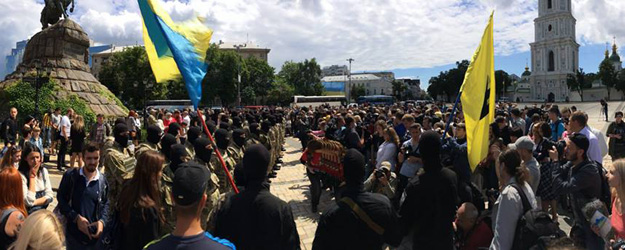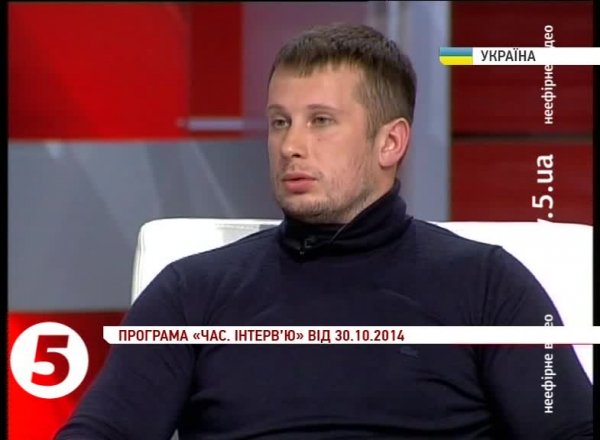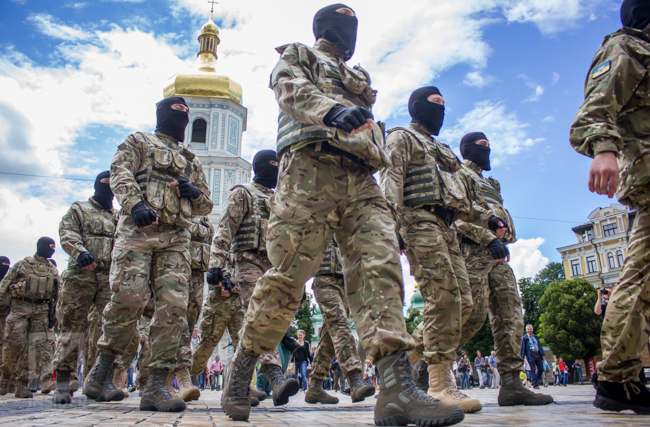Kateryna Sergatsova
On June 23rd, new “Azov” battalion recruits are leaving for the east of Ukraine. They will join the team of fighters that have become famous after conducting a “cleanse” in Mariupol from mercenaries. “Ukrainska Pravda” journalist spoke with the leaders of “Azov” and has gone to the base of the battalion near Berdiansk, where the fighters undergo training.
A small jet with a red cross on its wing lands in the space near the Kyiv Zhulyany airport. This is the only jet in Ukraine that is equipped to transport the wounded. It brought Ruslan, with the call sign “Legioner,” an “Azov” battalion fighter who was gravely wounded during the Mariupol separatist cleans. While the group moved down the street, a mine set up by the separatists exploded beneath his feet. His entire right arm was blown to pieces, several shells ended up in his stomach.
Ruslan is greeted by “Azov” leader, chairman of the organisation “Patriot of Ukraine” Andriy Biletskiy. He says something quietly to Ruslan and walks him to the ambulance car. Ruslan is smiling through his obvious pain.
Andriy himself is silent and concentrated. He does not look like a bloodthirsty cutthroat that the Russian propaganda media would describe him as. A regular thin man with a serious calm gaze. Someone like this won’t join a fight without accounting for every move.
Biletskiy spent 2,5 years in Kharkiv prison, and in the end of February he, just like Timoshenko, the “Vasylkiv terrorists” and the Pavlychenko family, were deemed political prisoners and set free. After this he participated in the battle with separatists in Kharkiv, and later founded “Azov” battalion.
This battalion consists for the most part of the same people as himself, political prisoners. It includes the “Vasylkiv terrorists,” Segiy Pavlychenko, and Tetiana Chornovol’s husband Mykola Berezovoy.
Despite the fact that he was set free after the change of government, Biletskiy thinks that the revolution is not over, and the government has not changed.
“Do you feel that the government has changed?” Andriy asks me with his characteristic calmness. “I don’t feel it. I am not fighting here for a state, but for my Motherland.”
The update of the Ukrainian police
“Azov,” just like other battalions which are part of the National Guard and Defence Ministry, is formed exclusively by volunteers. According to the assistant to the Minister of Internal Affairs Anton Herashchenko, the creation of such troops is the only correct way out of the situation which has formed in the Ukrainian law enforcement structures. Those who have been called to serve in the army are not sufficiently motivated to participate in military action in the east of the country, and the volunteers understand why they are going to war, and will probably not surrender their positions and weapons without a fight.
“What is the point in sending people with weapons, with equipment, when they go down without a fight?” Herashchenko asks. “Therefore we insist on volunteer troops. In the XXI century, where there is sex, drugs, computer games everywhere, a human being doesn’t want to go die. Why, if they can have a great party? And only few understand that there is something more important.”
According to the plan of the new MIA leadership, the volunteers that have joined the National Guard battalion, will form human resources reserves to update the Ukrainian police. Now there are about three thousand people serving in the battalion, and they plan to involve another 2,5 thousand volunteers.
“Now, of course, the battalions have a certain feeling of Makhno-style freedom,” says Herashchenko. “But they are real patriots, and we need to create a new police force where it has disintegrated completely, especially in the East.
In Donetsk oblast there are 17 thousand policemen, but de facto none of them are doing their duties. And we want to create a police force which will serve not a certain government, Kolomoyskiy, Avakov or Poroshenko, but the people directly.”
But are the fighters of the volunteer battalions themselves ready to become the new Ukrainian police?
“The main goal is to return Crimea to Ukraine”
By the gates of the training base of the “Azov” battalion I am greeted by Andriy Dzyndzia, a former activist of “Road Control” who spent almost two months in jail on charges of organising disorders near the President’s Administration on December 1st. He was one of the first to enroll in the battalion and is now officially a worker of the police force.
On June 13th, during the Mariupol “cleanse,” he took up arms for the first time.
“Before I have only held a photo and video camera in my hands,” laughs Dzyndzia.
“I was Tetiana Chornovol’s assistant in the anti-corruption bureau. The Verkhovna Rada failed the anti-corruption laws, any action in fighting bribery resulted in nothing, therefore I was forced to come here to be useful here,” the activist explains his joining the volunteer troop. “My friends from Automaidan are here as well. We simply understood that we may be more useful here than in Kyiv.”
Dzyndzia, according to his own words, never had any military training. But he thinks that it is unnecessary for the special operations akin to the one conducted in Mariupol.
“In reality it is more important to use one’s head here,” says he. “We have shown this in Mariupol: there are no victims on our side because we were careful in our planning. We conducted thorough intelligence work, analysed, re-checked. The preparation of the operation lasted almost two weeks.”
Dzyndzia’s main goal is to return Crimea to Ukraine: “Sooner or later we will do it,” he hopes.
The rest of the battalion soldiers, it seems, pose the same goal.
A “black man” with the call sign “Kholodniy” stands before me. He is very young, he is nineteen. He talks a lot, comprehensively and emotionally. In 2011 he joined Biletskiy’s organisation “Patriot of Ukraine,” and became engrossed in, according to him, “nationalist literature.” When Maidan began, “Kholodniy” participated in the Kharkiv movement, he was present when the Russian activists stormed the oblast state administration.
The young maximalist completely shares the views of the “White Chief” – this is how they call the “Azov” battalion leader, – and is in awe of how relations between the soldiers and the leadership are constructed.
“Here they are cultivating not the herd instinct, but great fraternal connections,” says “Kholodniy.” “They are trying to cultivate individuals in us, for each one of us be able to make a decision in such and such situation, to be an autonomous military unit. And if a person gets used to orders from above, they will not be much good.
Of course, we have a hierarchy, there is undisputed subordination to orders. But everyone likes that the commandment is very thorough with special operations. We are not being sent anywhere without a good reason. First we develop the tactic, train, we are told the tasks and goals, and only then do we leave for the location.”
The young man is skeptical about the idea of joining the police after the battalion: “Go cover the asses of some oligarchs and launder their money, while taking it from regular families? No. I have had to give bribes my entire life, to get a job, to finish my education… But if the higher government is replaced completely, then I could join the police.
Now it is most important to return Crimea and Kuban, and then we will see,” laughs “Kholodniy.” “Kuban is ethnic Ukrainian territory. And I want Ukrainians to return to our country.
When we become a powerful and self-sufficient country, then there will be no problems, the people will want to live here, they will ask themselves. And Crimeans too.”
During the breaks between training the soldiers discuss the political situation, retell new jokes about Russian propaganda. Near the bench on the asphalt, there is a pile of Novorossiya newspapers with an ode by the ideologist of separatism Alexandr Dugin about the “Defence Minister” of the PRD Igor Strelkov on the front page.
“We read these newspapers as jokes,” laughs one of the fighters. “Also we have a couple of PRD flags, we use them as rags.”
The fighter of the battalion Andriy, who had engaged in civil activities in Kherson just recently, and who worked as a member of the local council, thinks that the government in Ukraine has not changed, just like the rest of my interviewees in the battalion “Azov.”
“The national revolutions has crossed to a latent state and is now smouldering in the East,” says he. “If not for us, this plague would have spread even further, to Khrakiv and Dnipropetrovsk.
So the government should not forget who is protecting the country.
It is absolutely obvious that a lustration has to be carried out to prevent the regionals, communists and all who once worked with them from joining the government. If we don’t hold global cleanses in the higher government, we will get a Kuchma-era Ukraine: business clans will conspire among themselves.
We don’t need that, right?”
I ask one of the fighters what he will do after “Azov” does its duty in Donbas.
“We will go to Crimea, we will return it!” He says with a smirk. “But first we will go to Maidan once more. We have to remind the government why we are here now.”
Source: Ukrainska Pravda
Translated by Mariya Shcherbinina





